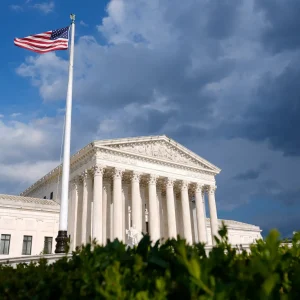GOP Set To Protect Trump Admin From Rogue Judges’ Contempt Rulings

The House Judiciary Committee’s section of a major spending bill includes a provision that critics argue could severely restrict judges’ ability to hold U.S. government officials in contempt of court—effectively giving the Trump administration leeway to disregard certain court orders.
The provision, known as Section 70303, appears in the final paragraph of the 116-page legislative text approved by the committee last week as part of the fiscal year 2025 budget resolution process, Roll Call reported.
The language bars courts from using federal funds to enforce contempt citations against government officials who fail to comply with court orders, unless plaintiffs post a monetary bond in accordance with civil procedure rules—a requirement that legal experts note is rarely applied in cases challenging federal policy.
But a House Judiciary Committee aide said the provision is meant “basically to stop frivolous lawsuits.”
Democrats argue that the provision would significantly undermine judicial authority, especially at a time when the Trump administration has shown open hostility toward judges issuing rulings against its policy initiatives.
At least two federal judges—Judge James E. Boasberg of the U.S. District Court for the District of Columbia and Judge Paula Xinis of the U.S. District Court of Maryland—have indicated they may hold Trump administration officials in contempt in immigration-related cases.
But Republicans counter that those two judges in particular, but also several others appointed by Democratic presidents, have regularly overstepped their authority with rulings that improperly and unconstitutionally limit the power of President Trump to run the Executive Branch. As such, some of them, as well as the president himself, have called for impeachment proceedings against at least one judge, Boasberg.
A House Republican lawmaker has introduced articles of impeachment against him after he blocked the Trump administration’s deportation flights conducted under the Alien Enemies Act, Fox News reported in March.
“For the past several weeks, we’ve seen several rogue activist judges try to impede the president from exercising, not only the mandate voters gave him, but his democratic and constitutional authority to keep the American people safe,” Rep. Brandon Gill, R-Texas, told Fox News Digital. “This is another example of a rogue judge overstepping his…authority.”
Gill’s resolution accuses Boasberg of abusing his authority by imposing an emergency halt on the Trump administration’s efforts to deport illegal immigrants under a wartime power established in 1798.
Trump recently invoked the law to remove members of the Venezuelan criminal gang Tren de Aragua from the U.S.
“Chief Judge Boasberg required President Trump to turn around planes midair that had aliens associated with Tren De Aragua, a designated Foreign Terrorist Organization,” the resolution said. “This conduct jeopardizes the safety of the nation, represents an abuse of judicial power, and is detrimental to the orderly functioning of the judiciary. Using the powers of his office, Chief Judge Boasberg has attempted to seize power from the Executive Branch and interfere with the will of the American people.”
In a brief interview with Fox News Digital just before filing his resolution, Gill indicated that he preferred the matter to proceed through the House in the traditional process, starting with a review by the House Judiciary Committee, where he serves as a member.
“I’ll be talking to [Chairman Jim Jordan, R-Ohio] about it,” Gill said. “I think the best way to do this…is to go through the judiciary committee, which is where impeachment of judges runs through. I think the more we can stick with that plan, the better.”

Regarding the nationwide injunctions being filed against the Trump administration, Roll Call continued, Rule 65 of the federal rules of civil procedure says that judges may issue a preliminary injunction or a temporary restraining order “only if the movant gives security in an amount that the court considers proper to pay the costs and damages sustained by any party found to have been wrongfully enjoined or restrained.”
But GOP critics contend that judges have not been following the rule, and the legislation will fix that.






